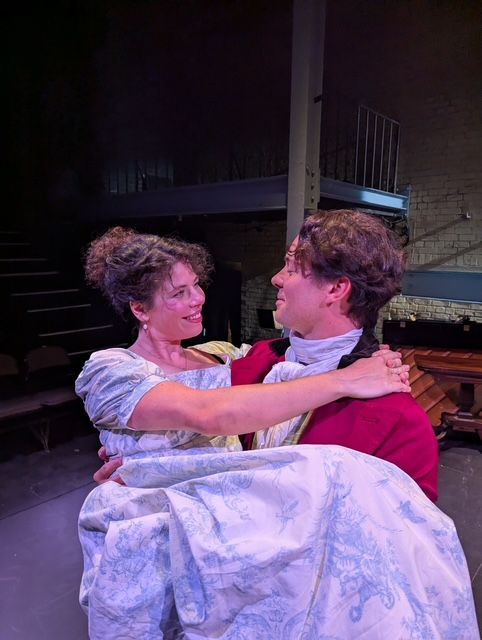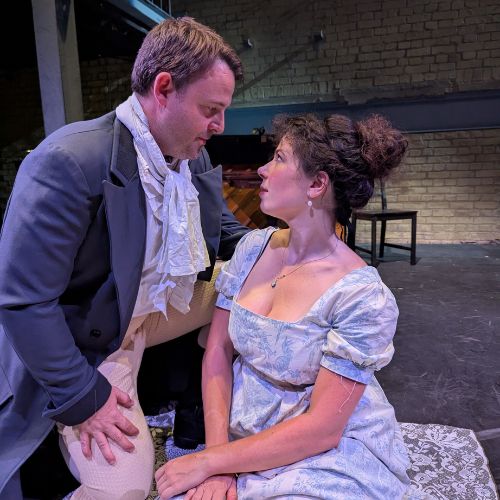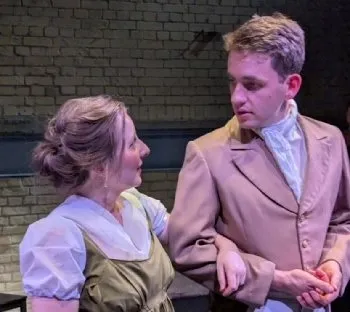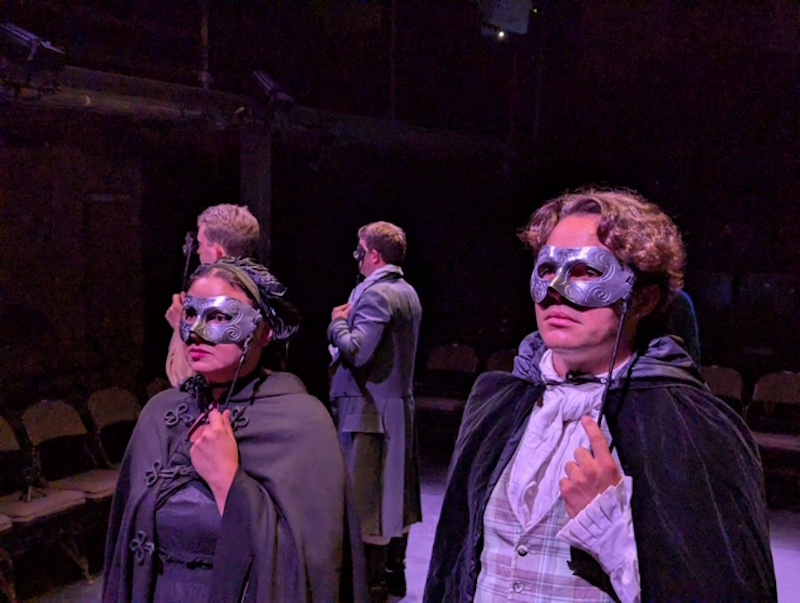Review by Simon Jenner, August 22 2025
★★★★
Here’s an old-style operetta masquerading as a musical – with a lot of dialogue. With Jane Austen at 250 we’re offered revivals of only a year old, with Adrian Lukis’ Being Mr Wickham back at Jermyn Street and this one of the 2009 Sense & Sensibility which tours appropriately to Bath after its stop-over in Dalston. With music by Neal Hampton, book and lyrics by Jeffrey Haddow, it’s Regency specialists Ledwell Productions’ version. It’s pacily directed too by Alexandra Cowell (with musical direction by Guy Murgatroyd) till August 23. This isn’t to be confused with the other American Sense & Sensibility musical. A chamber opera version by Paul Gordon appeared in 2014 and won plaudits. Around the same length (two-hours-fourteen) not counting an interval, it’s on YouTube.


Photo Credit: Camilla Greenwell
It’s remarkable how much plot Haddow cramps in round Hampton’s attractive and quite seriously-thewed music – which doesn’t have the feel of musicals at all, driven by Murgatroyd’s prominent-sounding piano leading a piano trio with some beguilingly rich harmonies from Daryl Giuliano (Cello) and Felicity Broome-Skelton (Violin). There’s instrumental solo passages lasting seconds that lend atmosphere too. Haddow’s lyrics don’t move the plot forward but amplify social position (one, ‘Society’, opening Act 2 with the ensemble wearing masks, semaphores the sisters’ precarity).
Nevertheless, a core Austen theme is filleted. Austen’s first published novel of 1811 centres financial hardship, a family ejected by half-siblings: something Austen went on to explore in Mansfield Park and which clouds futures in Pride and Prejudice. We see brief roles for Alexandra Cowell as Fanny Dashwood, and a witty aside later at her never appearing again in Cowell’s other role as Mrs Jennings. John Faal briefly appears as pucillanimous half-brother John Dashwood pushed by his wife to disinherit his sisters.
Elora Ledger’s ebullient Marianne, realised in an exuberant mezzo coloratura, certainly hits ringing soprano notes way up too. As Marianne sees herself as the heroine of every situation, it’s a touching and complex set of songs that also see her embrace sisterhood – and almost violently repudiate it at one point – heightening Austen’s novelistic tensions for the stage.
As Elinor, mezzo Rachael Liddell is consummate at saying the quiet bits out louder, in a lyric range that allows a shaft of deep passion and equally explosive, but more intense feelings to arise. Liddell embraces darker timbres in keeping with her part’s reflective and internalised broiling: but again deploys a full soprano range when required. Either privately, when Marianne is crossed or crosses her, or when she finds out Edward’s been long yoked to Lucy Steele.
Ledger also doubles for Lucy whom as Marianne whom she refers to as “that trollop”, another wink to the audience. Ledger’s Lucy is characterful, slightly parodic: her persona’s sly naivete distinct and squirmingly funny. Australian Ledger’s Devonshire slides occasionally to American-heiress-in-Devon mode. It’s not too intrusive and must have modified since early reports don’t credit the broad Devon and it’s definitely there now.

Alexandra Cowell as Mrs Jennings not only sings with a gleaming hug of a voice (the most penetrating), she also bustles her dialogue with an outrageously busy-body persona, full of matchmaking, glee and gossip. She’s enormous fun.
Having sloughed the wretched John Dashwood, John Faal’s Colonel Brandon is a youthfully believable 35 (as he is in the novel, antique to teen Marianne). In dialogue he mixes restraint with sudden confidings in a warmer tone, and outright fury. It’s in his voice too, his baritone particularly burnished in its middle and lower range.
James Beddoe’s Edward Ferrars is a tenor shy of his heroics, till he finds it. Beddoe even looks exactly as you feel Edward might (as do most of the cast), and his hesitant truth and internal wranglings are beautifully brought out: ardent and private, matching Liddell beautifully. There’s some shocking moments here too: wait for a slap.
Matthew Tilley’s baritonally gruff Sir John sings beautifully if you can credit the part allowing you to. It’s as Willoughby though that Tilley takes flight: this womanising, rouguish if not wholly insincere character is given lyric breath, entwined with Ledger in the Act One climax, and icily in its finale.
The six singers give soul to some beautifully-wrought music, occasionally memorable, always attractive. The music’s intricacy is well brought out in the trio reduction, and does occasionally drown the words: that’s with the piano slightly forward, and Arcola’s acoustics close and (here for once) slightly harsh.
The relatively bare set designed by “Dream of Eclectic” (probably in-house) has come in for undue criticism. It’s far less elaborate even than the simple if suggestive one for Jane Eyre here two weeks ago. Consisting of a folding card-table with chairs and props (repeated books and Elinor’s painting set), it’s cleared away by the cast in moments and there’s no distraction. Elora Ledger’s also responsible for gorgeous period costumes (and the production), with occasional pin-ons for quick-change.
Because of the admittedly lengthier-than-normal dialogue, nearly all the plot’s here (unlike the necessarily sung-through Jane Eyre for instance). This gives room for the emotions to land. The songs themselves do this too, though don’t lend the plot as much momentum as really dramatic numbers can do. But since the plot’s laid out, this matters less. The explosive moment when Elinor realises she can marry Edward after all is handled comically (characters get in the way of her moving forward). It seems curious since we want tears, not laughter at this point.
Nevertheless, Austen fans can feel they’re delivered the story’s heft, if not all its socially pinched circumstance. It’s a small gem. Catch it at Dalston or where you might find it next, at Bath’s Pump Rooms on 12-14 September, with newly-added performance dates. Where else?
Company Stage Manager Charlotte Tingley, Producer Elora Ledger
Photo Credit: Camilla Greenwell



